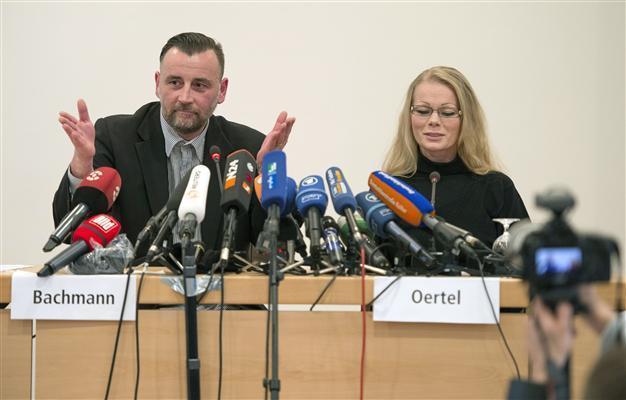Germany’s PEGIDA vows to rally again after attack threat
DRESDEN

Lutz Bachmann (L), leader of the anti-Islamic Pegida (Patriotic Europeans Against the Islamisation of the Occident) movement and Pegida spokeswoman Kathrin Oertel give a press conference on January 19, 2015 in Dresden, easatern Germany. AFP Photo
Germany’s “anti-Islamization” movement PEGIDA vowed at its first press conference Monday to take to the streets again next week after a march was cancelled over a terrorism threat.Asked about plans for future rallies in the eastern city of Dresden, the leader of the populist group, Lutz Bachmann, said that “next Monday obviously there will be another one, that’s the state of play right now.”
Police in Dresden had banned all public open-air gatherings within city limits for yesterday, citing the “concrete threat” of an assassination attempt against the group’s leaders.
PEGIDA instead urged followers to light a candle in their window and hang up the black-red-gold German national flag.
Amid criticism about the curtailing of the the right to demonstrate, Chancellor Angela Merkel stressed that the fundamental right to freedom of assembly “must wherever possible be protected”.
PEGIDA spokeswoman Kathrin Oertel said that in future “we won’t be deprived of the right to assembly and free speech.”
The self-styled “Patriotic Europeans Against the Islamization of the Occident”, founded three months ago, have drawn up to 25,000 people on to the streets in weekly rallies they dub “evening strolls”.
At the press conference, Bachmann and Oertel sought to reach out to what they have long dubbed the “lying press” and to moderate the group’s image, saying it was not against foreigners or Islam but against “Islamization.”
They distanced themselves from crude racist slurs, signs reading “Islam=cancer” and the presence of neo-Nazis at past rallies, insisting that most of their supporters are citizens fed up with contemporary politics.
In a list of six core demands, they called for immigration reform modelled on the Canadian system, to attract more skilled professionals and fewer refugees, and for more steps obliging foreigners to “integrate.”
They said “Islamists and religious fanatics must be expelled and not allowed to return”, while also calling for “direct democracy” through referendums and for tighter domestic security.
Wading into foreign policy, they also demanded an end to “warmongering against Russia and other states.”
The group mounted a charm offensive of sorts, saying it was ready to talk with the mainstream media as well as with political parties.
“The press conference is meant to be the start of a dialogue,” said Oertel, who the previous evening had outlined PEGIDA’s position for the first time in a popular public television talk show.
In recent weeks, some leaders of Germany’s new anti-euro party the Alternative for Germany (AfD) have openly voiced sympathies for PEGIDA, and some of its regional lawmakers have attended its demonstrations.
PEGIDA’s spokeswoman Kathrin Oertel said that “in coming days there will be talks with representatives of mainstream politics,” refusing however to name them or their parties.
Both Bachmann and Oertel stressed that they see themselves as concerned citizens, not politicians.
While Oertel said that “we don’t plan to keep walking the streets every Monday night”, Bachmann stressed that, once the group’s goals are achieved, he would prefer to “sit on the couch and enjoy the evening with my family.”
















